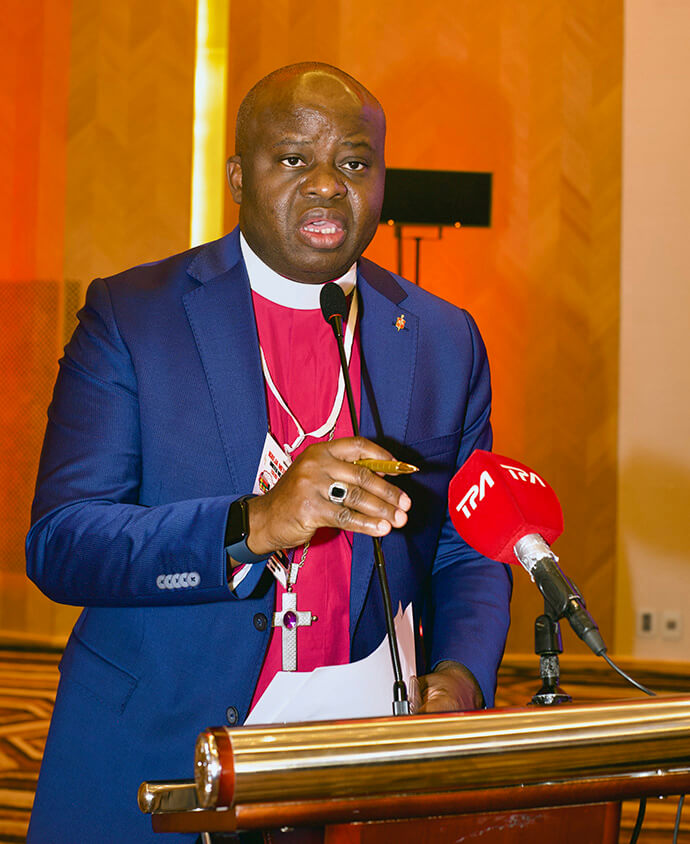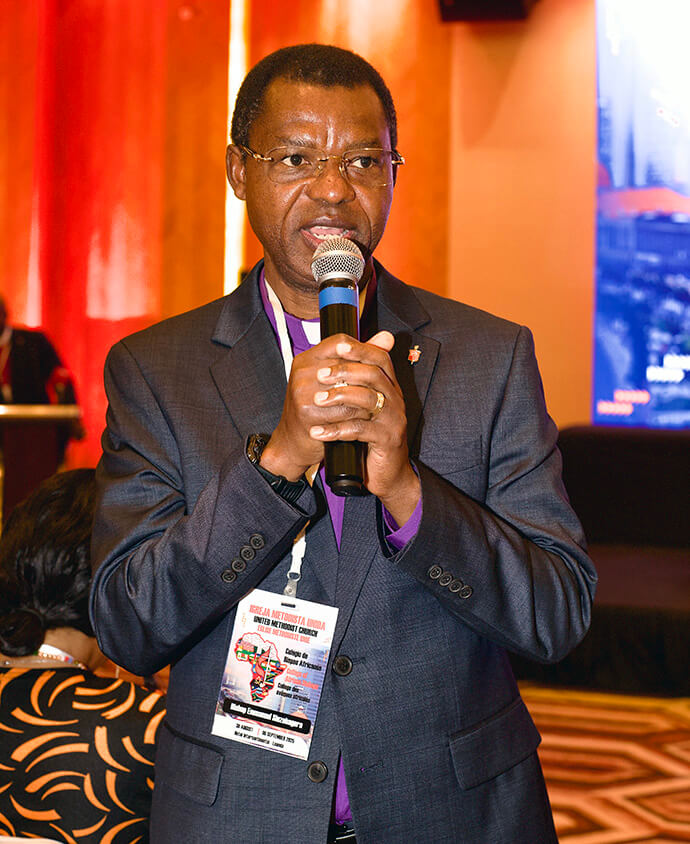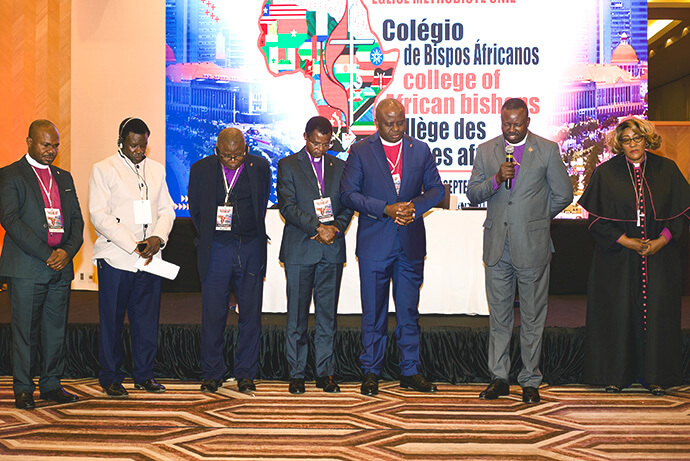Key points:
- The 17 bishops at the 2025 Africa Colleges of Bishops meeting pledged their support for regionalization as “a faithful and strategic path forward.”
- Bishop Mande Muyombo said regionalization and the church’s new vision are “critical steps towards building a more contextual church where Africa will no longer be considered as periphery.”
- Bishop Emmanuel Sinzohagera of the new Burundi-Rwanda Episcopal Area said the gathering offered a platform to interact and discuss issues affecting the church on the continent.
United Methodist bishops in Africa are celebrating the growth of the church on the continent, including the creation of two new episcopal areas and a new central conference.
In a statement at the close of the Africa Colleges of Bishops meeting Sept. 1-4 in Luanda, the bishops expressed joy at the election of nine new episcopal leaders and affirmed their support for regionalization, a package of amendments to the denomination’s constitution approved at General Conference, that, if ratified, would strengthen central conferences’ authority to set their own policies and practice ministry in their context.
“We reaffirm our unwavering commitment to the unity of The United Methodist Church. We believe that regionalization is a faithful and strategic path forward and this framework upholds our unity in Christ while honoring our diversity,” the bishops said.
“These developments affirm the fruitfulness of our mission and the continuing movement of God’s spirit among us.”
Each central conference in Africa — West Africa, the new East Africa, Mid Africa and Southern Africa — has its own college of bishops. African bishops select a president for the four colleges on a rotational basis. Bishop Mande Muyombo of North Katanga is the current president.
In their statement, the bishops encouraged the central conferences to adapt parts of the Book of Discipline, the denomination’s governing document, to suit their context.
“This allows us to maintain doctrinal unity while engaging in ministry that is meaningful and transformative in our African realities.”

The bishops reaffirmed that marriage on the African continent is a sacred covenant between one man and one woman.
“This view is consistent with our biblical convictions, African traditions, and the laws of our respective nations,” the bishops’ statement said. “We remain committed to practicing and teaching a holistic Christian sexual ethic rooted in Scripture and discipleship.”
Last year’s General Conference affirmed that central conferences can establish their own ordination and marriage policies in line with local laws.
Subscribe to our
e-newsletter
The statement also called for peace in countries affected by conflict; pledged support for the Central Conferences Theological Education Endowment Fund; stated the need to redefine episcopal boundaries in West Africa; and encouraged economic self-sustainability. The statement was signed by all 14 active bishops and three retired bishops in attendance.
In his opening address, Bishop Muyombo said The United Methodist Church is going through a significant shift in terms of its vision and structure.
“Passing of the regionalization legislation at the 2020-2024 General Conference and the launching of the new vision of The UMC are critical steps towards building a more contextual church where Africa will no longer be considered as periphery,” he said.
To be ratified, constitutional amendments need the support of at least two-thirds of the total annual conference voters worldwide. With voting still taking place, United Methodists won’t know until early November whether regionalization is ratified.
“It is time that we as the United Methodists submit to the Holy Spirit so that our church can be turned into pools of water that will bring about transformation in our various communities,” Muyombo said, in reference to the theme of the gathering drawn from Isaiah 41:18.
“We the bishops are called to lead through a vital and renewing spirit whereby we faithfully practice, model and lead spiritual disciplines of our faith and to call and inspire the clergy and laity within the church to practice Christian discipline in their individual lives through the tradition or personal holiness.”

Bishop João Filimone Sambo of the Mozambique-South Africa-Eswatini-Madagascar Episcopal Area was elected in March. He said he learned a lot at his first Africa colleges gathering.
“It’s been a learning experience,” he said. “This event was for me to learn and learn and learn. I guess at the next gathering I will have more to contribute. This time I was learning from these gurus — these great African leaders. They are very friendly, and the presentations helped to expand my horizons.”
Sierra Leone’s Bishop James Boye-Caulker, who was elected in December, was another first-time attendee.
“My first experience confirmed there are many challenges for the church — not only in Africa. But as believers in Christ, we should be able to stand up for justice and make sure things are done the right way,” he said.
Bishop Nelson Kalombo Ngoy of the newly established Tanganyika Episcopal Area said it was inspiring and exciting to meet his colleagues on the African continent. He was elected to the episcopacy in July.
“I’ve gained a great deal of knowledge, which will really help me to go back to my area and impact transformation and discipleship. I have been equipped so I can go and equip other leaders,” he said.
Bishop Emmanuel Sinzohagera, who also was elected in March and leads the new Burundi-Rwanda Episcopal Area, said the gathering offered a platform to interact and discuss issues affecting the church on the continent.
“It’s really a rich experience. The gathering can also help the church to deal with issues that Africans are facing. It’s a well-designed structure that can help bishops to interact among themselves, share experiences, learn from each other and go back home with a diverse perspective of how we should do our ministry,” he said.

The continent’s sole active female episcopal leader, Bishop Marie-Jeanne Mujinga Kashala of the South Congo Zambia Episcopal Area who was elected in July, said she felt comfortable among her colleagues.
“I observed that all the African bishops support each other in their ministry. I had a challenge with language, but I have good relations with other bishops in Africa,” she said.
One of the highlights of the 2025 gathering was a visit to Angolan President João Manuel Gonçalves Lourenço’s presidential palace.
After the meeting, Bishop Gaspar Domingos of West Angola expressed concern at conflicts in some parts of the continent. “Without peace and stability, the African population will never experience development,” he said.
Staff of United Methodist general agencies, which the bishops referred to as “strategic partners,” also were in attendance, along with representatives from Africa University, the top executive of the Africa Methodist Council, and bishops from the Anglican Church and Africa Methodist Episcopal Zion Church.
At the close of their statement, the African bishops shared their hopes for the future.
“We continue to walk forward in humility, boldness, rooted in the Word of God, led by the Holy Spirit and united in the love of Christ. As Africa rises, so too does our responsibility to be a light to the nations.”
Chikwanah is a UM News correspondent based in Harare, Zimbabwe.
News media contact: Julie Dwyer at (615) 742-5470 or newsdesk@umnews.org. To read more United Methodist news, subscribe to the free UM News Digests.




